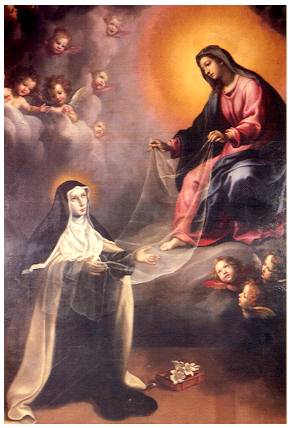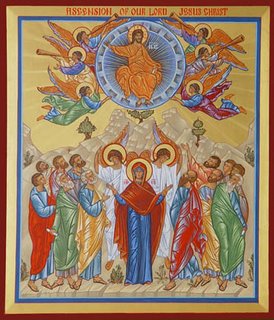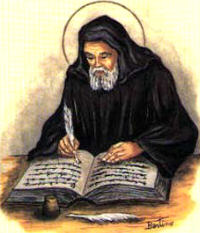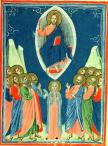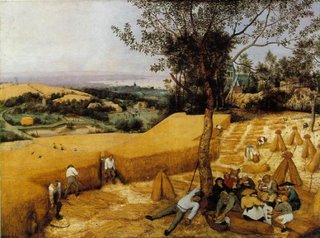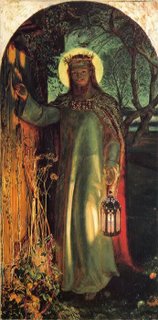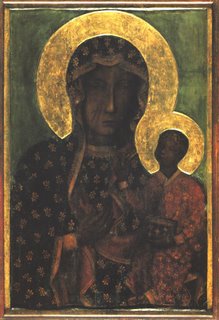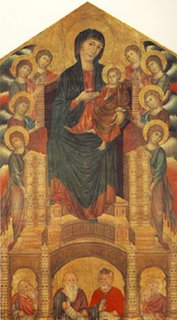I have come to cast fire upon the earth, and what will I but that it be kindled? Luke 12:49
From the earliest centuries of the Catholic Church, Christians have addressed suppliant prayers and hymns of praise to the Blessed Virgin Mary, and the hope they have placed in the Mother of the Saviour has never been disappointed. They have looked upon Her as Queen of Angels, Queen of Patriarchs, Queen of Prophets, Queen of Apostles, Queen of Martyrs, Queen of Virgins. Because of Her eminence, She is indeed entitled to the highest honors that can be bestowed upon any creature. Saint Gregory Nazianzen called Her Mother of the King of the entire universe, and the Virgin Mother who brought forth the King of the entire world.
His Holiness Pope Pius XII, in his Encyclical Letter of October 11, 1954, “Ad Coeli Reginam - On the Royal Dignity of the Blessed Virgin Mary and the Institution of Her Feast, ordaining its celebration throughout the world every year on May 31st, reminds us of what Pope Pius IX had said of Mary: “Constituted by the Lord as Queen of Heaven and earth, and exalted above all the choirs of Angels and the ranks of the Saints in heaven, standing at the right hand of Her only-begotten Son, Our Lord Jesus Christ, She petitions most powerfully with Her maternal prayers, and obtains what She seeks.” Pope Pius XII adds another ordinance: “We ask that on the feast day be renewed the consecration of the human race to the Immaculate Heart of the Blessed Virgin Mary. Upon this is founded a great hope that there may arise an era of happiness which will rejoice in the triumph of religion and Christian peace. Therefore let all approach, with greater confidence than ever before, to the throne of mercy and grace of our Queen and Mother, to beg help in difficulty, light in darkness and solace in trouble and sorrow.”
In asking this, the Holy Father was responding to the request of the Virgin Herself at Fatima in 1917, that the world and each soul individually be consecrated to Her Immaculate Heart. She promised that it will be then that “a time of peace will be given to the world.” Do not Mary’s rights as Queen require respect? And will we deny to Her maternal Heart the love it merits, for twenty centuries of uninterrupted intercession on behalf of Her children?
1. Hear my prayer, O Lord; give ear to my supplication in Thy truth: hearken unto me for Thy justice' sake
2. And enter not into judgement with Thy servant: for in Thy sight shall no man living be justified. (Ps 142)
2. And enter not into judgement with Thy servant: for in Thy sight shall no man living be justified. (Ps 142)
Consecration to Immaculate Heart of Mary
This is the formula whose making and living has opened the heavens for so many favoured souls:
"O Eternal and Incarnate Wisdom! O sweetest and most adorable Jesus! True God and true man, only Son of the Eternal Father, and of Mary, always virgin! I adore Thee profoundly in the bosom and splendours of Thy Father during eternity; and I adore Thee also in the virginal bosom of Mary, Thy most worthy Mother, in the time of Thine Incarnation.
"I give Thee thanks for that Thou hast annihilated Thyself, taking the form of a slave in order to rescue me from the cruel slavery of the devil. I praise and glorify Thee for that Thou hast been pleased to submit Thyself to Mary, Thy holy Mother, in all things, in order to make me Thy faithful slave through her. But, alas! Ungrateful and faithless as I have been, I have not kept the promises which I made so solemnly to Thee in my Baptism; I have not fulfilled my obligations; I do not deserve to be called Thy child, not yet thy slave; and as there is nothing in me which does not merit Thine anger and Thy repulse, I dare not come by myself before Thy most holy and august Majesty. It is on this account that I have recourse to the intercession of Thy most holy Mother, whom Thou hast given me for a mediatrix with Thee. It is through her that I hope to obtain of Thee contrition, the pardon of my sins, and the acquisition and preservation of wisdom.
"Hail, then, O Immaculate Mary, living tabernacle of the Divinty, where the Eternal Wisdom willed to be hidden and to be adored by angels and by men! Hail, O sure Refuge of Sinners, whose mercy fails no one. Hear the desires which I have of the Divine Wisdom; and for that end receive the vows and offerings which in my lowliness I present to thee.
"I, N., a faithless sinner, renew and ratify today in thy hands the vows of my Baptism; I renounce forever Satan, his pomps and works; and I give myself entirely to Jesus Christ, the Incarnate Wisdom, to carry my cross after Him all the days of my life, and to be more faithful to Him that I have ever been before.
"In the presence of all the heavenly court I choose thee this day for my Mother and Mistress. I deliver and consecrate to thee, as thy slave, my body and soul, my goods, both interior and exterior, and even the value of all my good actions, past, present and future; leaving to thee the entire and full right of disposing of me, and all that belongs to me, without exception, according to thy good pleasure, for the greater glory of God, in time and in eternity.
"Receive, o benignant Virgin, this little offering of my slavery, in honour of, and in union with, that subjection which the Eternal Wisdom deigned to have to thy maternity, in homage to the power which both of you have over this poor sinner, and in thanksgiving for the privilages with which the Holy Trinity has favoured thee. I declare that I wish henceforth, as thy true slave, to seek thy honour and to obey thee in all things.
"O admirable Mother, present me to thy dear Son as His eternal slave, so that as He has redeemed me by thee, by thee He may receive me! O Mother of mercy, grant me the grace to obtain the true Wisdom of God ; and for that end receive me among those whom thou lovest and teachest, whom thou leadest, nourishest and protectest as thy children and thy slaves.
"O faithful Virgin, make me in all things so perfect a disciple, imitator and slave of the Incarnate Wisdom, Jesus Christ thy Son, that I may attain, by thine intercession and by thine example, to the fullness of His age on earth and of His glory in Heaven. AMEN."
"I give Thee thanks for that Thou hast annihilated Thyself, taking the form of a slave in order to rescue me from the cruel slavery of the devil. I praise and glorify Thee for that Thou hast been pleased to submit Thyself to Mary, Thy holy Mother, in all things, in order to make me Thy faithful slave through her. But, alas! Ungrateful and faithless as I have been, I have not kept the promises which I made so solemnly to Thee in my Baptism; I have not fulfilled my obligations; I do not deserve to be called Thy child, not yet thy slave; and as there is nothing in me which does not merit Thine anger and Thy repulse, I dare not come by myself before Thy most holy and august Majesty. It is on this account that I have recourse to the intercession of Thy most holy Mother, whom Thou hast given me for a mediatrix with Thee. It is through her that I hope to obtain of Thee contrition, the pardon of my sins, and the acquisition and preservation of wisdom.
"Hail, then, O Immaculate Mary, living tabernacle of the Divinty, where the Eternal Wisdom willed to be hidden and to be adored by angels and by men! Hail, O sure Refuge of Sinners, whose mercy fails no one. Hear the desires which I have of the Divine Wisdom; and for that end receive the vows and offerings which in my lowliness I present to thee.
"I, N., a faithless sinner, renew and ratify today in thy hands the vows of my Baptism; I renounce forever Satan, his pomps and works; and I give myself entirely to Jesus Christ, the Incarnate Wisdom, to carry my cross after Him all the days of my life, and to be more faithful to Him that I have ever been before.
"In the presence of all the heavenly court I choose thee this day for my Mother and Mistress. I deliver and consecrate to thee, as thy slave, my body and soul, my goods, both interior and exterior, and even the value of all my good actions, past, present and future; leaving to thee the entire and full right of disposing of me, and all that belongs to me, without exception, according to thy good pleasure, for the greater glory of God, in time and in eternity.
"Receive, o benignant Virgin, this little offering of my slavery, in honour of, and in union with, that subjection which the Eternal Wisdom deigned to have to thy maternity, in homage to the power which both of you have over this poor sinner, and in thanksgiving for the privilages with which the Holy Trinity has favoured thee. I declare that I wish henceforth, as thy true slave, to seek thy honour and to obey thee in all things.
"O admirable Mother, present me to thy dear Son as His eternal slave, so that as He has redeemed me by thee, by thee He may receive me! O Mother of mercy, grant me the grace to obtain the true Wisdom of God ; and for that end receive me among those whom thou lovest and teachest, whom thou leadest, nourishest and protectest as thy children and thy slaves.
"O faithful Virgin, make me in all things so perfect a disciple, imitator and slave of the Incarnate Wisdom, Jesus Christ thy Son, that I may attain, by thine intercession and by thine example, to the fullness of His age on earth and of His glory in Heaven. AMEN."
Credits: text of consecration after "Consecration to the Immaculate Heart of Mary According to the Spirit of St. Louis de Montfort's True devotion to Mary"- by Fr Nicholas A. Norman
Meditation after 'Heavenly Friends: a Saint for each Day' by Rosalie Marie Levy (Saint Paul Editions: Boston, 1958).


